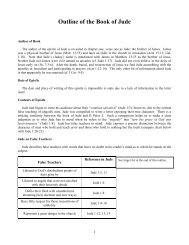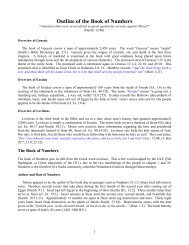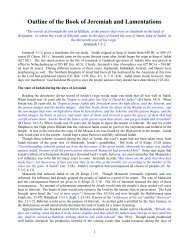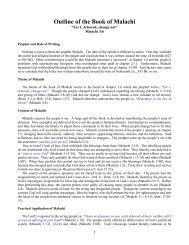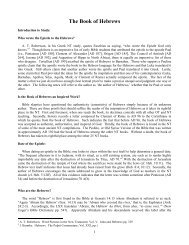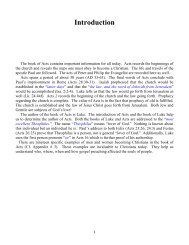Outline of the Book of I Timothy - The Floral Heights Church of Christ
Outline of the Book of I Timothy - The Floral Heights Church of Christ
Outline of the Book of I Timothy - The Floral Heights Church of Christ
Create successful ePaper yourself
Turn your PDF publications into a flip-book with our unique Google optimized e-Paper software.
many are weak and sickly among you, and many sleep” (I Cor. 11:30). Those who did not<br />
practice truth were spiritually weak and dead (unhealthy).<br />
4. Finally Paul states that this sound doctrine, <strong>the</strong> gospel <strong>of</strong> God, has been “committed to my trust.”<br />
Paul took his apostleship and <strong>the</strong> eternal souls <strong>of</strong> men serious. <strong>The</strong> only thing that would see man<br />
into eternity with God was <strong>the</strong> “sound doctrine.” Paul is admonishing <strong>Timothy</strong> to guard against<br />
man’s propensity to admix truth with error. Latter, Paul will admonish <strong>Timothy</strong> saying, “guard<br />
that which is committed unto <strong>the</strong>e...” (I Tim. 6:20).<br />
II. Paul examines his own sinful past to illustrate how that those who accept, obey, teach, and guard<br />
truth can be saved by <strong>the</strong> mercy <strong>of</strong> God (1:12-17):<br />
A. "I thank him that enabled me, even <strong>Christ</strong> Jesus our Lord, for that he counted me faithful, appointing<br />
me to his service" (1:12).<br />
1. Paul was thankful that <strong>Christ</strong> Jesus "enabled" him to <strong>the</strong> work <strong>of</strong> an apostle. To "enable"<br />
(endunamosanti) (NM = empowering / 821) = "to empower or invigorate" (Moulton 138). Paul<br />
was invigorated and empowered by <strong>Christ</strong> Jesus to do <strong>the</strong> work or "service" <strong>of</strong> <strong>the</strong> Lord. <strong>The</strong><br />
service <strong>of</strong> <strong>Christ</strong> was to sanctify man by his blood and through <strong>the</strong> teaching <strong>of</strong> sound doctrine. <strong>The</strong><br />
author <strong>of</strong> Hebrews wrote, "Follow after peace with all men, and <strong>the</strong> sanctification without which<br />
no man shall see <strong>the</strong> Lord" (Heb. 12:14) (see study # 8 and # 13).<br />
2. Note that Paul, once again, addresses his apostleship (see I Tim. 1:1). Not only was Paul an apostle<br />
by <strong>the</strong> "commandment <strong>of</strong> God" (I Tim. 1:1) but now he writes that he was "appointed" this service<br />
by Jesus <strong>Christ</strong>. <strong>The</strong> word "appointed" (<strong>the</strong>menos) = "to place, set, appoint" (Moulton 404). This<br />
setting and appointing <strong>of</strong> Paul as an apostle was foreknown by <strong>the</strong> Lord at Paul's birth (see Gal.<br />
1:15). Paul was very grateful <strong>of</strong> all that God had done for him (see study # 4; <strong>The</strong> Apostle Paul).<br />
B. "Though I was before a blasphemer, and a persecutor, and injurious: howbeit I obtained mercy,<br />
because I did it ignorantly in unbelief;" (1:13).<br />
1. <strong>The</strong> Lord had appointed Paul to <strong>the</strong> work <strong>of</strong> sanctifying mankind even though he had previously<br />
been (see study # 4):<br />
a. "Blasphemous" (blasphemon) = "calumnious, railing, reproachful" (Moulton 70). <strong>The</strong> word<br />
"calumnious" means "slanderous and defamatory" (AHD 231). <strong>The</strong> same Greek word is found<br />
at II <strong>Timothy</strong> 3:2 and translated "railers." Paul seems to have had a past <strong>of</strong> disrespectful<br />
railing at people and things that he did not have a proper knowledge <strong>of</strong>.<br />
b. "Persecutor" (see I Cor. 15:9-15; Gal. 1:13).<br />
c. Thirdly, Paul was guilty <strong>of</strong> "injurious" (hubristen) (Nestle Marshall text translates <strong>the</strong> word<br />
"insolent" [i.e., presumptuous and insulting in manner or speech; arrogant {AHD 665}]<br />
behavior. <strong>The</strong> Greek word is defined as "an overbearing, wantonly violent person" (Moulton<br />
412). <strong>The</strong> only o<strong>the</strong>r place this word is found is Romans 1:30 (see study # 4; <strong>The</strong> Apostle<br />
Paul).<br />
2. When one examines Paul's former life it may be that we are perplexed as to how such a reproachful<br />
and violent person could be used by <strong>the</strong> Lord. Note that Paul is able to write <strong>the</strong>se things about<br />
himself which infers that he now realizes <strong>the</strong> sinfulness <strong>of</strong> such behavior. <strong>The</strong> point is that <strong>the</strong><br />
gospel is able to change <strong>the</strong> vilest <strong>of</strong> men. God is <strong>the</strong> "God <strong>of</strong> mercy" (II Cor. 1:3; Eph. 2:4).<br />
3. Paul obtained mercy "because I did it ignorantly in unbelief." Paul's reproachful and violent acts<br />
against <strong>Christ</strong>ianity were done in ignorance yet with a clear conscience (see Acts 26:9). Secondly,<br />
Paul's reproachful and violent acts against <strong>Christ</strong>ianity were done in "unbelief." <strong>The</strong> book <strong>of</strong> Acts<br />
equates "belief" with "obedience" and "unbelief" with "disobedience" (see Acts 13:38-39; 14:1-2,<br />
21; 19:8-9, 18; 28:23-24). Paul was not persuaded that Jesus was <strong>the</strong> <strong>Christ</strong> and <strong>the</strong>reby did not<br />
obey His authorized words (see Acts 8:2-3; 26:10-11).<br />
4. Question: Did Paul's ignorance and unbelief in <strong>Christ</strong> excuse him from eternal judgment? Does<br />
man's ignorance and unbelief excuse him from judgment today? No! (see Rom. 2:1, 12-15;<br />
10:1ff). While God is patience and longsuffering with <strong>the</strong> ignorant He will not ever suffer <strong>the</strong>m<br />
(Hebrews 5:2-3). Ignorance and unbelief will never be a viable excuse at judgment because God<br />
has given revelation to cure man's ignorance (I Cor. 2:6-13) and creation to cure man's unbelief<br />
(see Psalms 19:1ff; Rom. 1:19ff) (see study # 5; Man's Excuses for Disobedience).<br />
9



